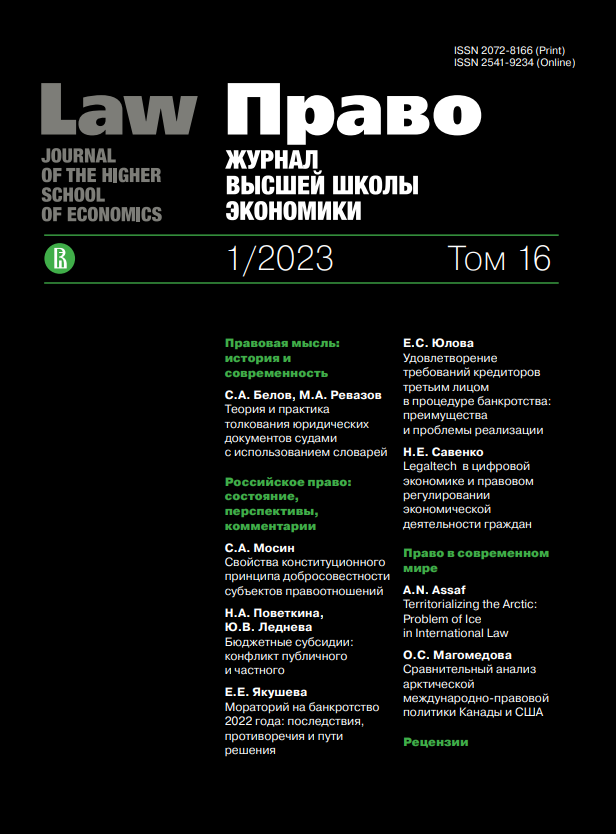Теория и практика толкования юридических документов судами с использованием словарей
Аннотация
При осуществлении правосудия имеет место толкование разных документов, в первую очередь, юридических — нормативных актов и договоров.
Это толкование зачастую становится предметом споров в судах. Поскольку суд должен изложить основания принятого им решения, в тексте судебного акта обосновывается выбор варианта толкования и демонстрируется, что этот выбор объективен. Выбранное толкование может аргументироваться ссылками на значение слова, в котором оно обычно используется и которое зафиксировано в словаре. Это не единственный способ выявить обычное значение слова, однако наиболее простой и потому активно используемый судами. В России и в США количество и характер ссылок на словари в решениях судов различаются: в американских судах это стало широко применяемой практикой, практика высших судов России насчитывает лишь несколько десятков такого рода примеров. Российские суды чаще прибегают к словарям для толкования слов, которые в юридических документах имеют специальное значение, но при этом используют словари общеупотребительной лексики. Американские суды чаще толкуют слова общеупотребительного языка, для толкования правовых терминов обращаются к специализированным словарям. В обеих юрисдикциях обращение к общим словарям мотивируется тем, что в юридических документах используется обычный, неспециальный язык, хотя в юридических текстах происходит терминологизация слов путем свойственного праву более строгого, более точного и определенного употребления слов, которые за пределами правовых текстов многозначны или размыты по значению. Ссылки на словари в судебных актах не достигают цели их использования в судебных делах — не обеспечивается объективность толкования: выбор словаря и значения слова в словаре остается произвольным усмотрением судьи. В связи с этим задачи толкования слов юридических документов должны решаться методами корпусного анализа юридического языка, лингвистической экспертизой или путем составления специализированных юридических словарей. Последний способ является наиболее эффективным.
Литература
Aprill E. (1998) The law of the word: dictionary shopping in the Supreme Court. Arizona State Law Journal, vol. 30, no. 2, pp. 275-336.
Batyushkina M.V. (2020) Legal concept and legal term: features of correlation and definitions (based on the material of Russian laws). Vestnik Kemerovskogo universiteta=Bulletin of Kemerovo University, vol. 22, no. 1, pp. 207-215 (in Russ.) DOI: https://doi.org/10.21603/2078-8975-2020-22-1-207-215
Brudney J., Baum L. (2013) Oasis or mirage: The Supreme Court's thirst for dictionaries in the Rehnquist and Roberts eras. William and Mary Law Review, vol. 55, pp. 483-580. DOI: https://doi.org/10.2139/ssrn.2195644
Coon N. (2019) 162 years of dictionary use in the Oregon appellate courts. Willamette Law Review, vol. 55, no. 2, pp. 213-260.
Eskridge W. (1995) Cases and materials on legislation: statutes and the creation of public policy. St. Paul: West Publishing Co., 970 p.
Golev N.D. (1999) The legal aspect of language in linguistic coverage. Urislingvist ika=Jurislinguistics, no. 1, pp. 12-59 (in Russ.)
Green S. (2010) Understanding CERCLA through Webster's New World dictionary and state common law: forestalling the federalization of property law. New England Law Review, vol. 44, no. 4, pp. 835-868.
Hutton C. (2011) Objectification and transgender jurisprudence: the dictionary as quasi-statute. Hong Kong Law Journal, vol. 41, no. 1, pp. 27-47.
Katrechko N.A. (2009) The law as the key to justice (based on the material of the German language). Filologicheskie nauki=Philological Sciences, no. 2, pp. 136-140 (in Russ.)
Khabibulina N.I. (2012) Grammatical interpretation of the norms of law. Rossiyskaya ustitcia=Russian justice, no. 7, pp. 56-62 (in Russ.)
Kirchmeier J. (2010) Scaling the lexicon fortress: the United States Supreme Court's use of dictionaries in the twenty-first century. Marquette Law Review, vol. 94, no. 1, pp. 77-262.
Mersky R. (2006) The Dictionary and the man: eighth edition of Black's law dictionary. Washington and Lee Law Review, vol. 63, no. 2, pp. 719-733.
Mouritsen S. (2010) The dictionary is not a fortress: definitional fallacies and a corpus-based approach to plain meaning. Brigham Young University Law Review, no. 5, pp. 1915-1978.
Mouritsen S. (2017) Corpus linguistics in legal interpretation. An evolving interpretative framework. Journal of Legal Linguistic, vol. 6, pp. 67-89.
Nelson C. (2003) Originalism and interpretive conventions. University of Chicago Law Review, vol. 70, pp. 519-598. DOI: https://doi.org/10.2307/1600589
Ozhegov S.I., Shvedova N. Yu. (1996) Explanatory dictionary of the Russian language. 3rd ed. Moscow: AZ press, 928 p. (in Russ.)
Scalia A. (1995) Common-law courts in a civil-law system: the role of United States federal courts in interpreting the Constitution and laws. The Tanner Lectures on Human Values, 1995, pp. 77-121.
Solan L., Gales T. (2016) Finding ordinary meaning in law: the judge, the dictionary or the corpus? International Journal of Legal Discourse, vol. 1, no. 2, pp. 253-276. DOI: https://doi.org/10.1515/ijld-2016-0016
Tankersley D. (2018) Beyond the dictionary: why Sua Sponte judicial use of corpus linguistics is not appropriate for statutory interpretation. Mississippi Law Journal, vol. 87, no. 4, pp. 641-677. DOI: https://doi.org/10.2139/ssrn.3117223
Thumma S., Kirchmeier J. (1999) The lexicon has become a fortress: The United States Supreme Court's use of dictionaries. Buffalo Law Review, vol. 47, pp. 227-302.
Trubachev O.N. (1988) Methods of semantic reconstruction. Comparative historical study of languages of different families. Theory of linguistic reconstruction. Moscow: Nauka, pp. 197-222 (in Russ.)
Vinogradov V.V. (1977) The main types of lexical meanings of the word. In: Selected works. Lexicology and lexicography. Moscow: Nauka, pp. 162-189 (in Russ.)
Yates S. (2011) Black's law dictionary: the making of an American standard. Law Library Journal, vol. 103, no. 2, pp. 175-198.
Copyright (c) 2023 Право. Журнал Высшей школы экономики

Это произведение доступно по лицензии Creative Commons «Attribution-ShareAlike» («Атрибуция — На тех же условиях») 4.0 Всемирная.


















